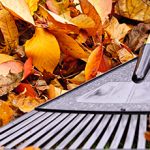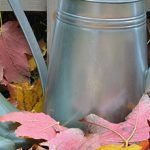5 natural weed killers to help get rid of those unwanted plants
May 16, 2018 | Gardening Tips & Advice | No comments

Spring is in full bloom, with its abundance of flowers and colourful tree blossoms, signalling that summer isn’t far away. Unfortunately spring also brings unwelcome plants in the form of weeds, taking up space and sprouting in areas around the home like the patio and garden. They also cause allergies and some like giant hogweed are notorious for being difficult to remove. If you don’t want to use chemical sprays and solutions, there are natural alternatives you can try, which might just work before more decide to sprout up. Learn more about what natural products you can use.
Boiling water

Simple and effective, boil your kettle or pan of water and pour the water onto the weed. Be careful not to scald yourself with the water when pouring and aim for the crown of the weed. You might need to do this a few times to kill the weed and try not to get the water onto plants you want to keep. Also this approach won’t damage the soil for replanting.
Salt

You can use either rock salt or table salt and it is best to create a solution, not pour salt directly onto the weed. Create a solution of 3:1 parts water and salt and using a spray bottle, spray onto the weed. Do this carefully only spraying on the intended weed, avoiding other plants. You can add more salt to the solution daily until it starts to kill the weed.
White Vinegar

Use white vinegar by pouring directly onto the weed. As vinegar is acidic it will kill other plants it gets onto so be careful not to get it onto other greenery you want to keep. It may be easier and more precise if you use a spray bottle or paint onto the weed. You may need to repeat this process a few times but it is highly effective.
Bicarbonate of soda (baking soda)

This works best on young weeds on patios, walkways and driveways. It also helps if you apply after it has rained when the plants are wet or you could water them beforehand. Sprinkle the bicarbonate of soda over the top of the weed and sweep into the cracks. Be careful not to sprinkle onto plants you want to keep as it will also damage them. Repeat treatments as necessary until the weed is killed giving about a month in-between.
Mulch

Mulching will create a barrier to prevent weeds from sprouting but the layer needs to be about 2-3 inches. The best ones to prevent weeds are organic mulches like bark and mulch also helps soil retain moisture in the summer. When mulching if you have a bed of perennials, allow the flowers to push through first and for annual plants, plant them first. As the mulch decomposes, remember to replace it.
Take care when handling weeds and always use gloves in case of allergic reactions. They might take a few applications but natural weed killers are more environmentally friendly then chemical solutions, so you will be doing your bit to help the environment. Find out tips on how to deal with allergies at this time of year in our 10 tips to tackle hay fever season.
Tags: garden, gardening, natural weed killers, weed killers, weeding, weeds






